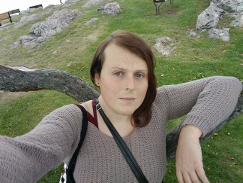
Dr. Naomi Wixon
Email: d e e p p y r e AT gmail DOT com
Pronouns: She/Her/Hers & They/Them/Theirs, either is acceptable
This page will hopefully remain under construction for the forseeable future. ^_^
So a few of you may be confused by the name change in authorship of my publications. I'm transgender. My preferred pronouns are "she/her", or a singular "they" (as a gender neutral pronoun) when referring to me. Please feel free to google the "transgender" or "singular they" or check wikipedia or ask me about my own relationship with my gender. A big caveat here: I'm not necessarily willing to discuss my personal life in all contexts and with all people, but you're encouraged to ask in less-professional contexts if you're curious. In professional contexts it's fine to raise the issue if you feel it to be relevant to the subject at hand e.g. addressing the needs of transgender individuals.
I don't actually *like* to make a big deal out of being transgender, but I recognize looking back at my former publications by "Michael Wixon", and a few just by "Wixon" can be confusing.
Lately doctoral studies have been challenging. I build detectors of affect/emotion. Recently, I've started to question how we look at the construct itself, and am considering moving toward cognitive attributions regarding emotions and using grounded techniques to try and address this from a students' perspective.
vvvvvvvvvvvvv About me circa 2013 vvvvvvvvvvvvv
At my core I'm an engineer, not a scientist. At the end of the day teaching people and improving their quality of life are more important to me than more abstract scientific questions.
But toward the end of improving quality of life... it's probably a good idea to be at least a little mindful of your metrics... particularly when you're dealing with something as nebulous as "learning" or "quality of life". So rather than being purely a builder, I'd like to research the most effective ways to build.
As such a lot of my interest focuses on disengagement and affect. I think that by getting a better understanding of what the student is doing, and maybe even inferring a little of what the student might be feeling, I hope to better serve the student.
So improving construct validity can lead to better models, which can help people learn. It's a wonderful "big idea" and I feel my colleague Mike Sao Pedro has made a significant contrubition with it. Seriously, check his stuff out, particularly this paper.
There are many reasons researchers pursue construct validity. As for me better models of learning, affect, and motivation serve as one of the best means to the end of teaching.
My foremost concern is the application of these models in various environments, and assessing their efficacy towards measurable good outcomes. This is why, while I'm not interested in building the world's greatest ITS (intelligent tutoring system) I still consider myself an engineer rather than a scientist.
So contact me if you've got some research opportunities I can help out with!